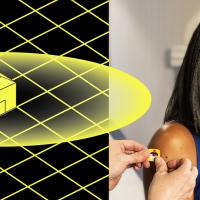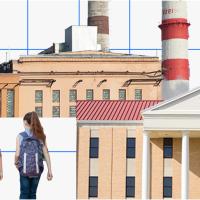As the U.S. continues to navigate the fallout from the pandemic, vaccine and health equity remains a challenge in many of the nation’s most vulnerable communities.
It’s part of a broader pattern of health inequalities. Since the pandemic began, the virus and its societal consequences have disproportionately afflicted people in low-income neighborhoods, which include a higher share of people of color. The Centers for Disease Control and Prevention has consistently found that people who rank higher on its social vulnerability index — which accounts for social factors like income, race, household composition, and housing and transportation — are more likely to suffer from COVID-19 and less likely to be vaccinated.
Some communities are faring far worse than others.
In Alabama, the majority of counties had less than a 30% vaccination rate as of July — less than half the national rate of about 70%. To boost vaccine coverage and help residents navigate pandemic-related problems, some organizations have turned to a more localized, on-the-ground approach that capitalizes on existing relationships between residents and community leaders.
The church that’s working toward vaccine equity
The Metropolitan United Methodist Church in Montgomery had been a multifaceted community resource for residents long before COVID-19, providing at-risk residents with food and other resources. When the pandemic struck, those efforts kicked into overdrive.
It began with a drive-up food pantry. About 30 people came to pick up food during the first week of the food drive, in the early days of the pandemic. As the virus spread and the lockdown progressed, more people began showing up. At the height of the pandemic, Williams and his team were providing free food to more than 1,000 people each week.
“At the end of the year, we celebrated that we moved over 70 tons of food, and we served 19,000 households,” Williams told Freethink. “The food pantry was just the beginning.”
Pastor Richard Williams and other church leaders began working with local organizations to stop forced evictions, and they provided free STD tests and condoms to the community, which was suffering higher rates of STDs amid the pandemic. The church also helped residents get health screenings and COVID-19 tests. But as COVID-19 vaccines began to roll out across the nation, the church saw that many residents who most needed protection against the virus weren’t getting it.
The church decided to utilize its longstanding community trust and relationships by helping launch the Get Out the Vaccine initiative. As a collaboration between the church and nonprofit organizations ideas42 and Partners In Health, the program educates residents about vaccination and helps them sign up for and get to vaccine appointments.
Removing friction between residents and vaccines is the goal.
One strategy the project uses to do that is hosting block parties that offer free food, music, art, bouncy castles for the kids, and vaccinations and vaccine education to anyone in the community. Project leaders say this kind of face-to-face engagement can be invaluable in boosting vaccine coverage rates.
“The language we use is very important,” Cicily Gray, the project manager for Partners In Health in Montgomery, told Freethink. “It dictates the narrative around this pandemic, and around vaccine uptake. […] I have seen barriers [for vaccination] drop just by giving a person information in a way they can understand.”
The initiative not only helps at-risk communities, but also takes input from residents as to how it can better further its mission.
“We allow the community to tell us that, ‘Hey, pastor, that’s a great location,’ or ‘Hey, I loved that event, but you really need to do one three streets over because the factory [workers] — they’re going to be off work at 7 o’clock,’” Williams told Freethink.
Overcoming health inequities and medical mistrust
The SARS-CoV-2 virus doesn’t inherently infect people differently based on race or class. But as the virus spread across the nation, it sometimes affected groups differently because of longstanding socioeconomic disparities. COVID-19 was most likely to kill poor people and Black Americans, especially in the early days of the pandemic.
Why? First consider essential workers. The Kaiser Family Foundation estimates that Blacks and Hispanics are about 8% more likely than other groups to work essential jobs that put them in frequent contact with other people, and therefore at higher risk of contracting the virus. Black Americans from low-income backgrounds are particularly likely to have pre-existing medical conditions like diabetes, heart disease, and asthma, all of which can make COVID-19 cases more severe.
Poor people and people of color are also less likely to have health insurance and easy access to healthcare infrastructure. For example, a recent study published by Health Affairs found that Black and Hispanic neighborhoods tend to have fewer pharmacies and more pharmacy closures than predominantly white or diverse communities.
Access to healthcare infrastructure became even more important when COVID-19 vaccines became available.
A 2021 study from researchers at the University of Pittsburgh found that Black Americans are significantly more likely than other groups to have to drive more than 1 mile to access a vaccination site, which can be especially difficult for low-income workers without reliable transportation.
But part of the reason Black Americans have generally shown lower vaccine uptake is because of vaccine hesitancy. Since COVID-19 vaccines became available, Black Americans have consistently reported higher levels of hesitation and distrust of the vaccine than White Americans, though this gap seems to be closing. On a broader scale, Black Americans express higher levels of medical distrust: A 2020 survey found that about 70% said the health care system treats people unfairly based on race “very often” or “somewhat often.”
In Montgomery, leaders of the Get Out the Vaccine initiative are working to ease medical distrust by talking face-to-face with residents with whom they’ve built personal relationships.
“If you’re connected to the neighbors, if you’re connected to the community, you can do the work — if they trust you,” Williams told Freethink.
Additional footage courtesy of Serquest.


